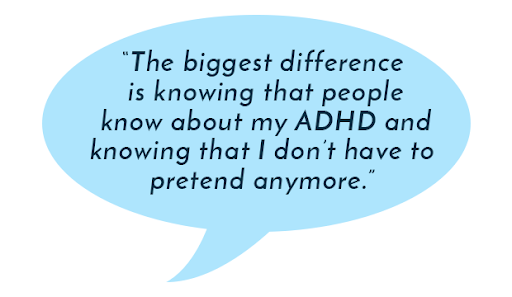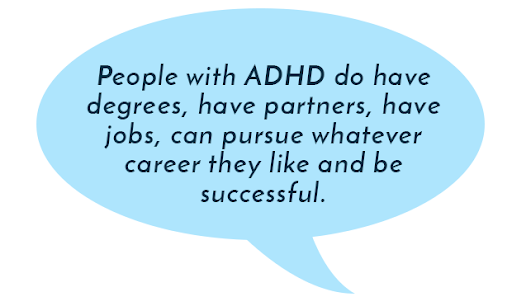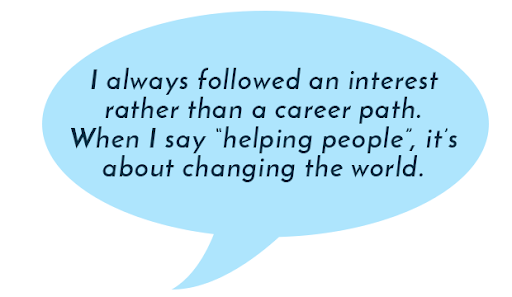“If we don’t talk about ADHD diagnosis, that stigmatisation and nonsense will continue.” [ND@Work]
![“If we don’t talk about ADHD diagnosis, that stigmatisation and nonsense will continue.” [ND@Work]](https://static1.s123-cdn-static-a.com/uploads/5695988/2000_6187e7c1b10f1.png)
Rachel Worsley | 26 June 2021
Samantha Nuttall discusses why she is breaking the professional silence about ADHD at work and shares her tips on finding a supportive workplace.
Samantha Nuttall had a successful career in HR and Career Coaching and previously worked as the Relationship Manager at the Australian Network on Disability before starting her business The Neurodivergent Coach.
In this original article published in 2020, Samantha shares why she is breaking the professional silence about ADHD at work and shares her tips on finding a supportive workplace.

NeuroWork: When and how did you receive your diagnosis of ADHD?
I received the diagnosis at the end of 2018. I was 41. I always knew that I work differently than other people, but it never had that name of ADHD. On reflection, I always felt that some things were a lot harder for me than for other people. My school reports always said: “If Sam would only stop talking and concentrate, she could do so much better.” If I had a special superpower, it’s about being able to work very hard with a deadline coming. So, I found exams extremely easy, but I found coursework a lot harder.
When I had my two boys, there were some question marks about whether they had ADHD, so I started reading. I came across an article that specifically spoke about girls at school, and I thought “oh my goodness, that is textbook me.” I started to do more reading and and and it just really made sense and explained a lot for me. I went to a GP, got referred to a specialist and they agreed with me.
NeuroWork: What was your reaction to receiving the diagnosis?
Receiving the diagnosis felt like an awesome sense of relief. I didn’t feel grief at all. I did feel a bit of frustration that it hadn’t been picked up earlier. You can’t help but think about the “what ifs”. I did two degrees, I did well at school and I have a successful career. But what if I had the support and medication, where would I be now? What things would have been easier? But the diagnosis has given me an opportunity to find a tribe to share things with.

NeuroWork: Tell me a little bit about your interests and careers and the job seeking challenges that you faced along the way.
I always knew that I wanted to do something to do with people and help to make things better. I toyed with being a teacher. I always followed an interest rather than a career path. When I say “helping people”, it’s about changing the world.
I didn’t find it difficult to find work during my teenage years. I’m quite outgoing and chatty so customer service roles were quite fitting. I worked in lots of different retail jobs. I wasn’t that good at waitressing though because I had to remember orders. My customer service skills overcame the disorganisation.
After University, I followed a career in Recruitment and HR and then worked as a Career Coach. I wouldn’t say I experienced many difficulties in being employed or having a successful career, but I’ve certainly had to overcome challenges related to my disability (even if I didn’t know about it!) along the way.
After I received my diagnosis, I did attend interviews where it was obvious that my disability was an issue for others. I had experiences where I shared my disability or the fact that I might need adjustments in the workplace and I was met with that change in demeanour from the interviewer. As a neurodiverse person, you’re always scanning for those changes in demeanour, always scanning for that lack of understanding. There was a feeling that by sharing that information, I ran the risk of not getting the job.
NeuroWork: What inspired you to move from career coaching into your role with the Australian Network on Disability (AND)?
I worked in HR and recruitment in large corporates for about 15 years. When I had my kids, I did a postgraduate qualification in coaching psychology at University of Sydney and I worked at the University of Sydney for three years as a career coach. When the kids were diagnosed as autistic and adhd, I suddenly entered this world where I had an awareness of neurological differences. Because of my role as a career coach, I was conscious of the statistics around autistic graduates and the low employment rate for those graduates compared with other graduates.
And I thought that for people like my kids, that situation was an absolute ticking time bomb. If this doesn’t change, my kids will not have great employment outcomes. That’s just not something that I’m going to sit back and allow to happen.
I reflected on my own practices working in large corporates as a recruiter and realised there was a lack of understanding in many of those places of the unintended barriers or systemic barriers that people with disability face when entering the workplace. I thought this is something that I want to change and that something needs to happen around this problem.
When the job came up at Australian Network on Disability, I thought it was an amazing opportunity to use the skills and knowledge that I had working in HR and coaching. And it was to use the passion and determination that I’ve got to make a difference for my kids and other people with disability to change the system and overcome unintended barriers to work.
NeuroWork: What do you do at AND?
I’m a Relationship Manager. Our members are large corporates and government agencies. My role as a relationship manager is working with those organisations to identify their access and inclusion goals and plans, providing consultancy services such as supporting them to develop a workplace adjustment or other policy, reviewing dignified access for premises, providing learning and development courses and many other solutions. We bring organisations together at regular roundtables and other events. It’s really all about supporting organisations to remove the unintended barriers for people with disability and for them to become Disability Confident.

NeuroWork: How did AND respond to your disclosure of ADHD at work?
Well first of all, we use the term ‘Sharing Information’ rather than disclosing which I think sums up the way that we see that conversation. During the recruitment process, the job advert stated very clearly say they welcome applications for people with disability and make adjustments for people to do the job. In every stage of the application process, they asked me whether I needed anything to make it easier. There was no flinching when I brought up my ADHD diagnosis. It was just a normal conversation about what it would take from my perspective to do my best work.
NeuroWork: What kind of accommodations do you ask for at work?
I often ask for that double-check at work. It’s not seen as incompetence, but just asking whether I can get a proofread to check if I made errors that haven’t been picked up, because I tend to be a big picture person. I can find things like meetings with lots of people talking difficult because it's having to listen and write and think about what I want to say while I have to moderate my own impulsivity around talking. So, sometimes I ask to record meetings.
I have regular catch-ups with my manager. I have requests to do things emailed to me, rather than asking me to do things verbally. These accommodations are all free or cheap. There's no cost involved to the company. It's just about a change of attitude.
NeuroWork: What kind of support do you get from management?
I’ve got an open manager who is really supportive and always asks me: “What do you need? How can I help?” I always trust that she thinks about the kind of work that she gives me and considers what I’m good at. I think she loves my creative problem-solving. She draws on my strengths and doesn’t put me in difficult situations that I find too challenging.
The biggest difference is knowing that people know about my ADHD and knowing that I don’t have to pretend anymore. As an example, I didn't have to sit in that meeting with everyone talking, taking the minutes with anxiety and think that everyone’s going to think I’m stupid for not remembering half of it. Before I got diagnosed, I just lived under this grey cloud of constant worry that I was going to get found out for being an imposter.”
NeuroWork: How open are you about your diagnosis to your co-workers or clients?
I’m pretty open with everyone, although it’s not something I would open a business meeting with. If ADHD comes up and it seems important to do so, I would share about the diagnosis in business meetings or with clients. For me, neurodiversity is an important part of my identity. I think it’s important not to hide these diagnoses. We should bring the neurodiversity out of the shadows. I hear about people making assumptions about what’s possible for themselves or other people about diagnosis. But if we don’t talk about diagnosis, that stigmatisation and nonsense will continue. People with ADHD do have degrees, have partners, have jobs, can pursue whatever career they like and be successful.

NeuroWork: What advice would you offer about how women with ADHD can find a supportive workplace?
Sharing information about your diagnosis is obviously up to you. For some people, it’s a terrifying prospect and they don’t want to talk about it openly and they may not be working in a supportive environment. For me, putting ADHD on the table and asking for adjustments is super important. If people can’t understand it, I don’t want to work for them. I know masking causes a lot of problems for me.
There are other ways to check if an environment is safe if you are not comfortable to share your information. If the organisation is a member of AND, you know the organisation has made some commitment to best practice to the inclusion of people with disability and is working towards being accessible. So, something you should check is if an organisation have a commitment to accessibility and inclusion.
Do they talk about it on their website? Do they have a senior person talking about welcoming people with disabilities to jobs in their marketing material? Do they talk about it in their job adverts? Does the workplace have a workplace adjustment policy and procedure? Otherwise, you will be relying on your manager or the person interviewing you and whether they are doing the right thing. That’s really important.
For me, gut feeling goes a long way. I knew the minute I started speaking to AND and when I met them, that I would love working with them and that they would support me and that they would nurture “the real me”, without me having to mask. When I reflect on the good or bad managers I had along the way, it’s always had that gut feeling.
NeuroWork: What advice would you offer women with ADHD who want to find the right job or career for them?
If you are neurodiverse, even more so than others you have to be aware of your strengths and the things that you find challenging. What are the things that you are good at, effortlessly which set you apart from other people? What are the challenges that you’re going to have that are not going to change? Trying to solve those challenges by changing yourself will often mean solving them at the expense of your mental health.
Ask yourself what kind of adjustments might I need to succeed in any situation? What do you need in a job to be happy? For me, it’s about building relationships or making a difference. It’s about what you want to do in terms of your values. Do you want to earn lots of money, or is it about making a difference to something? When you stir up all those things in a big pot, you tend to come up with a few career options. You could use your skills in lots of ways. You’ve always got options, which is always important.
You shouldn’t settle for doing something that doesn’t make you happy and compromises your mental health. I think it’s very easy as a neurodiverse person to compromise on your mental health and mask, because that’s what everyone is taught to do. But committing to a job or a company is like any relationship. You need to know the important things to you and you need to be clear on those boundaries. Trust in the light you can bring to the world and you will find the right career and workplace for you.

Her Lawyer is the law firm for ambitious women in business. Their team of friendly female lawyers help clients to build, grow and protect amazing businesses. They offer contracts, employment law, leasing, intellectual property and related legal services – anything legal you need for your business, Her Lawyer are here to help.